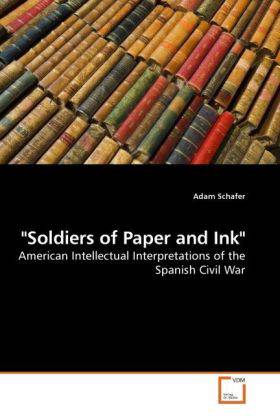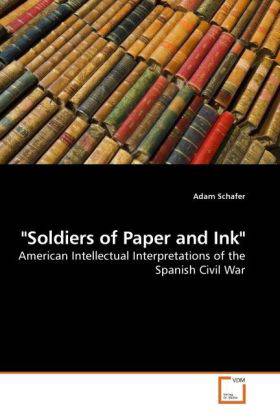
- Afhalen na 1 uur in een winkel met voorraad
- Gratis thuislevering in België vanaf € 30
- Ruim aanbod met 7 miljoen producten
- Afhalen na 1 uur in een winkel met voorraad
- Gratis thuislevering in België vanaf € 30
- Ruim aanbod met 7 miljoen producten
Zoeken
"Soldiers of Paper and Ink"
American Intellectual Interpretations of the Spanish Civil War
Adam Schafer
Paperback | Engels
€ 48,45
+ 96 punten
Omschrijving
This book analyzes the works of four intellectuals who matured between the World Wars: two North Americans, Langston Hughes and Edwin Rolfe; and two Latin Americans Pablo Neruda and César Vallejo. They viewed the Spanish Civil War as the defining moment of their era. A close examination of their writings shows that they interpreted the war using a Marxist framework with unique valences. Hughes saw race as a key factor; the Nationalists were racists and, in contrast, African-American volunteers combated slavery by fighting fascism in Spain. Rolfe portrayed American volunteers as the descendants of an American revolutionary tradition that had a crucial part in liberating the working class, starting in Spain. For Neruda, the egalitarianism of the Spanish peasantry took the moral high ground against the subhuman, foreign Nationalists. Vallejo combined Marxism and Catholicism to show the Republicans as on a crusade to free Mother Spain from the militant masculinity of the Nationalists. These intellectuals not only contributed to the history of the Spanish Civil War, but they also shaped the writer s role as an agent in representing the significance of conflicts throughout history.
Specificaties
Betrokkenen
- Auteur(s):
- Uitgeverij:
Inhoud
- Aantal bladzijden:
- 108
- Taal:
- Engels
Eigenschappen
- Productcode (EAN):
- 9783639209686
- Uitvoering:
- Paperback
- Afmetingen:
- 150 mm x 220 mm
- Gewicht:
- 160 g

Alleen bij Standaard Boekhandel
+ 96 punten op je klantenkaart van Standaard Boekhandel
Beoordelingen
We publiceren alleen reviews die voldoen aan de voorwaarden voor reviews. Bekijk onze voorwaarden voor reviews.







